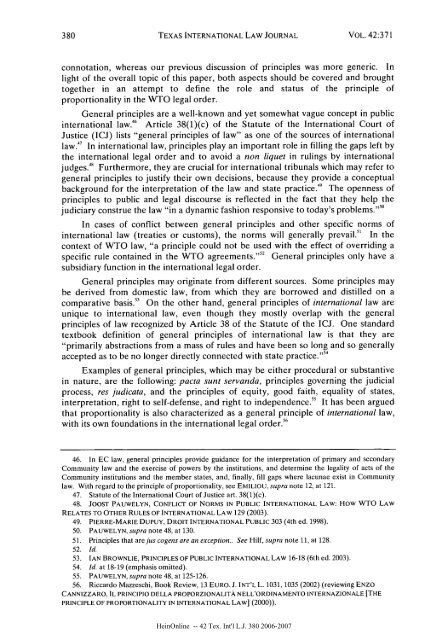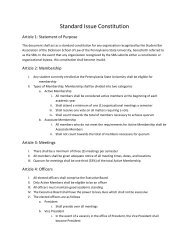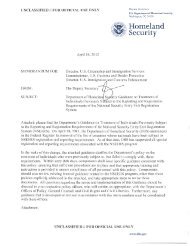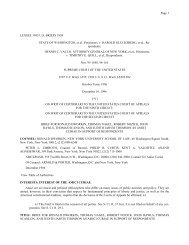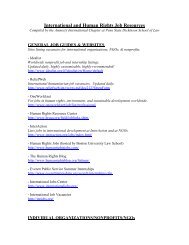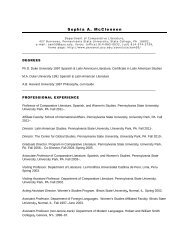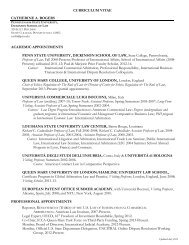- Page 1 and 2: TEXAS Volume 42 INTERNATIONAL Numbe
- Page 3 and 4: DISCLOSURE AS A PUBLIC POLICY INSTR
- Page 5 and 6: Introduction JAY LAWRENCE WESTBROOK
- Page 7 and 8: Proportionality: WTO Law: in Compar
- Page 9 and 10: 2007 PROPORTIONALITY: WTO LAW IN CO
- Page 11 and 12: 2007 PROPORTIONALITY: WTO LAW IN CO
- Page 13 and 14: 2007 PROPORTIONALITY: WTO LAW IN CO
- Page 15: 2007 PROPORTIONALITY: WTO LAW IN CO
- Page 19 and 20: 2007 PROPORTIONALITY: WTO LAW IN CO
- Page 21 and 22: 2007 PROPORTIONALITY: WTO LAW IN CO
- Page 23 and 24: 2007 PROPORTIONALITY: WTO LAW IN CO
- Page 25 and 26: 2007 PROPORTIONALITY: WTO LAW IN CO
- Page 27 and 28: 2007 PROPORTIONALITY: WTO LAW IN CO
- Page 29 and 30: 2007 PROPORTIONALITY: WTO LAW IN CO
- Page 31 and 32: 2007 PROPORTIONALITY: WTO LAW IN CO
- Page 33 and 34: 2007 PROPORTIONALITY: WTO LAW IN CO
- Page 35 and 36: 2007 PROPORTIONALITY: WTO LAW IN CO
- Page 37 and 38: 2007 PROPORTIONALITY: WTO LAW IN CO
- Page 39 and 40: 2007 PROPORTIONALITY: WTO LAW IN CO
- Page 41 and 42: 2007 PROPORTIONALITY: WTO LAW IN CO
- Page 43 and 44: 2007 PROPORTIONALITY: WTO LAW IN CO
- Page 45 and 46: 2007 PROPORTIONALITY: WTO LAW IN CO
- Page 47 and 48: 2007 PROPORTIONALITY: WTO LAW IN CO
- Page 49 and 50: 2007 PROPORTIONALITY: WTO LAW IN CO
- Page 51 and 52: 2007 PROPORTIONALITY: WTO LAW IN CO
- Page 53 and 54: 2007 PROPORTIONALITY: WTO LAW IN CO
- Page 55 and 56: 2007 PROPORTIONALITY: WTO LAW IN CO
- Page 57 and 58: 2007 PROPORTIONALITY: WTO LAW IN CO
- Page 59 and 60: 2007 PROPORTIONALITY: WTO LAW IN CO
- Page 61 and 62: 2007 PROPORTIONALITY: WTO LAW IN CO
- Page 63 and 64: 2007 PROPORTIONALITY: WTO LAW IN CO
- Page 65 and 66: The Modernization of European Compe
- Page 67 and 68:
2007 THE MODERNIZATION OF EUROPEAN
- Page 69 and 70:
2007 THE MODERNIZATION OF EUROPEAN
- Page 71 and 72:
2007 THE MODERNIZATION OF EUROPEAN
- Page 73 and 74:
2007 THE MODERNIZATION OF EUROPEAN
- Page 75 and 76:
2007 THE MODERNIZATION OF EUROPEAN
- Page 77 and 78:
Corporate Gatekeeper Liability in C
- Page 79 and 80:
2007 CORPORATE GATEKEEPER LIABILITY
- Page 81 and 82:
2007 CORPORATE GATEKEEPER LIABILITY
- Page 83 and 84:
2007 CORPORATE GATEKEEPER LIABILITY
- Page 85 and 86:
2007 CORPORATE GATEKEEPER LIABILITY
- Page 87 and 88:
2007 CORPORATE GATEKEEPER LIABILITY
- Page 89 and 90:
2007 CORPORATE GATEKEEPER LIABILITY
- Page 91 and 92:
2007 CORPORATE GATEKEEPER LIABILITY
- Page 93 and 94:
2007 CORPORATE GATEKEEPER LIABILITY
- Page 95 and 96:
2007 CORPORATE GATEKEEPER LIABILITY
- Page 97 and 98:
2007 CORPORATE GATEKEEPER LIABILITY
- Page 99 and 100:
2007 CORPORATE GATEKEEPER LIABILITY
- Page 101 and 102:
2007 CORPORATE GATEKEEPER LIABILITY
- Page 103 and 104:
2007 CORPORATE GATEKEEPER LIABILITY
- Page 105 and 106:
2007 CORPORATE GATEKEEPER LIABILITY
- Page 107 and 108:
2007 CORPORATE GATEKEEPER LIABILITY
- Page 109 and 110:
2007 CORPORATE GATEKEEPER LIABILITY
- Page 111 and 112:
Harmonization and Modernization in
- Page 113 and 114:
2007 HARMONIZATION AND MODERNIZATIO
- Page 115 and 116:
2007 HARMONIZATION AND MODERNIZATIO
- Page 117 and 118:
2007 HARMONIZATION AND MODERNIZATIO
- Page 119 and 120:
2007 HARMONIZATION AND MODERNIZATIO
- Page 121 and 122:
2007 HARMONIZATION AND MODERNIZATIO
- Page 123 and 124:
2007 HARMONIZATION AND MODERNIZATIO
- Page 125 and 126:
2007 HARMONIZATION AND MODERNIZATIO
- Page 127 and 128:
2007 HARMONIZATION AND MODERNIZATIO
- Page 129 and 130:
2007 HARMONIZATION AND MODERNIZATIO
- Page 131 and 132:
2007 HARMONIZATION AND MODERNIZATIO
- Page 133 and 134:
2007 HARMONIZATION AND MODERNIZATIO
- Page 135 and 136:
2007 HARMONIZATION AND MODERNIZATIO
- Page 137 and 138:
2007 HARMONIZATION AND MODERNIZATIO
- Page 139 and 140:
2007 HARMONIZATION AND MODERNIZATIO
- Page 141 and 142:
2007 HARMONIZATION AND MODERNIZATIO
- Page 143 and 144:
2007 HARMONIZATION AND MODERNIZATIO
- Page 145 and 146:
2007 HARMONIZATION AND MODERNIZATIO
- Page 147 and 148:
2007 HARMONIZATION AND MODERNIZATIO
- Page 149 and 150:
2007 HARMONIZATION AND MODERNIZATIO
- Page 151 and 152:
Property Rights, Collateral, Credit
- Page 153 and 154:
2007 PROPERTY RIGHTS, COLLATERAL, C
- Page 155 and 156:
2007 PROPERTY RIGHTS, COLLATERAL, C
- Page 157 and 158:
2007 PROPERTY RIGHTS, COLLATERAL, C
- Page 159 and 160:
2007 PROPERTY RIGHTS, COLLATERAL, C
- Page 161 and 162:
2007 PROPERTY RIGHTS, COLLATERAL, C
- Page 163 and 164:
2007 PROPERTY RIGHTS, COLLATERAL, C
- Page 165 and 166:
2007 PROPERTY RIGHTS, COLLATERAL, C
- Page 167 and 168:
2007 PROPERTY RIGHTS, COLLATERAL, C
- Page 169 and 170:
2007 PROPERTY RIGHTS, COLLATERAL, C
- Page 171 and 172:
2007 PROPERTY RIGHTS, COLLATERAL, C
- Page 173 and 174:
2007 PROPERTY RIGHTS, COLLATERAL, C
- Page 175 and 176:
2007 PROPERTY RIGHTS, COLLATERAL, C
- Page 177 and 178:
2007 PROPERTY RIGHTS, COLLATERAL, C
- Page 179 and 180:
2007 PROPERTY RIGHTS, COLLATERAL, C
- Page 181 and 182:
2007 PROPERTY RIGHTS, COLLATERAL, C
- Page 183 and 184:
2007 PROPERTY RIGHTS, COLLATERAL, C
- Page 185 and 186:
2007 PROPERTY RIGHTS, COLLATERAL, C
- Page 187 and 188:
2007 PROPERTY RIGHTS, COLLATERAL, C
- Page 189 and 190:
2007 PROPERTY RIGHTS, COLLATERAL, C
- Page 191 and 192:
2007 PROPERTY RIGHTS, COLLATERAL, C
- Page 193 and 194:
2007 PROPERTY RIGHTS, COLLATERAL, C
- Page 195 and 196:
2007 PROPERTY RIGHTS, COLLATERAL, C
- Page 197 and 198:
Negotiation in Letter of Credit Pra
- Page 199 and 200:
2007 NEGOTIATION IN LETTER OF CREDI
- Page 201 and 202:
2007 NEGOTIATION IN LETTER OF CREDI
- Page 203 and 204:
2007 NEGOTIATION IN LETTER OF CREDI
- Page 205 and 206:
2007 NEGOTIATION IN LETTER OF CREDI
- Page 207 and 208:
2007 NEGOTIATION IN LETTER OF CREDI
- Page 209 and 210:
2007 NEGOTIATION IN LETTER OF CREDI
- Page 211 and 212:
2007 NEGOTIATION IN LETTER OF CREDI
- Page 213 and 214:
2007 NEGOTIATION IN LETTER OF CREDI
- Page 215 and 216:
2007 NEGOTIATION IN LETTER OF CREDI
- Page 217 and 218:
2007 NEGOTIATION IN LETTER OF CREDI
- Page 219 and 220:
2007 NEGOTIATION IN LETTER OF CREDI
- Page 221 and 222:
2007 NEGOTIATION IN LETTER OF CREDI
- Page 223 and 224:
2007 NEGOTIATION IN LETTER OF CREDI
- Page 225 and 226:
2007 NEGOTIATION IN LETTER OF CREDI
- Page 227 and 228:
2007 NEGOTIATION IN LETTER OF CREDI
- Page 229 and 230:
2007 NEGOTIATION IN LETTER OF CREDI
- Page 231 and 232:
2007 NEGOTIATION IN LETTER OF CREDI
- Page 233 and 234:
Theorizing Transnational Commercial
- Page 235 and 236:
2007 THEORIZING TRANSNATIONAL COMME
- Page 237 and 238:
2007 THEORIZING TRANSNATIONAL COMME
- Page 239 and 240:
2007 THEORIZING TRANSNATIONAL COMME
- Page 241 and 242:
2007 THEORIZING TRANSNATIONAL COMME
- Page 243 and 244:
2007 THEORIZING TRANSNATIONAL COMME
- Page 245 and 246:
2007 THEORIZING TRANSNATIONAL COMME
- Page 247 and 248:
2007 THEORIZING TRANSNATIONAL COMME
- Page 249 and 250:
2007 THEORIZING TRANSNATIONAL COMME
- Page 251 and 252:
2007 THEORIZING TRANSNATIONAL COMME
- Page 253 and 254:
2007 THEORIZING TRANSNATIONAL COMME
- Page 255 and 256:
Developing a New Commercial Court i
- Page 257 and 258:
2006 DEVELOPING A NEW COMMERCIAL CO
- Page 259 and 260:
2006 DEVELOPING A NEW COMMERCIAL CO
- Page 261 and 262:
Developing Global Transnational Har
- Page 263 and 264:
2007 DEVELOPING GLOBAL TRANSNATIONA
- Page 265 and 266:
2007 DEVELOPING GLOBAL TRANSNATIONA
- Page 267 and 268:
2007 DEVELOPING GLOBAL TRANSNATIONA
- Page 269 and 270:
2007 DEVELOPING GLOBAL TRANSNATIONA
- Page 271 and 272:
2007 DEVELOPING GLOBAL TRANSNATIONA
- Page 273 and 274:
2007 DEVELOPING GLOBAL TRANSNATIONA
- Page 275 and 276:
2007 DEVELOPING GLOBAL TRANSNATIONA
- Page 277 and 278:
2007 DEVELOPING GLOBAL TRANSNATIONA
- Page 279 and 280:
2007 DEVELOPING GLOBAL TRANSNATIONA
- Page 281 and 282:
2007 DEVELOPING GLOBAL TRANSNATIONA
- Page 283 and 284:
2007 DEVELOPING GLOBAL TRANSNATIONA
- Page 285 and 286:
2007 DEVELOPING GLOBAL TRANSNATIONA
- Page 287 and 288:
2007 DEVELOPING GLOBAL TRANSNATIONA
- Page 289 and 290:
2007 DEVELOPING GLOBAL TRANSNATIONA
- Page 291 and 292:
2007 DEVELOPING GLOBAL TRANSNATIONA
- Page 293 and 294:
2007 DEVELOPING GLOBAL TRANSNATIONA
- Page 295 and 296:
2007 DEVELOPING GLOBAL TRANSNATIONA
- Page 297 and 298:
Canadian Preference Law Reform ANTH
- Page 299 and 300:
2007 CANADIAN PREFERENCE LAW REFORM
- Page 301 and 302:
2007 CANADIAN PREFERENCE LAW REFORM
- Page 303 and 304:
2007 CANADIAN PREFERENCE LAW REFORM
- Page 305 and 306:
2007 CANADIAN PREFERENCE LAW REFORM
- Page 307 and 308:
2007 CANADIAN PREFERENCE LAW REFORM
- Page 309 and 310:
2007 CANADIAN PREFERENCE LAW REFORM
- Page 311 and 312:
2007 CANADIAN PREFERENCE LAW REFORM
- Page 313 and 314:
2007 CANADIAN PREFERENCE LAW REFORM
- Page 315 and 316:
2007 CANADIAN PREFERENCE LAW REFORM
- Page 317 and 318:
2007 CANADIAN PREFERENCE LAW REFORM
- Page 319 and 320:
2007 CANADIAN PREFERENCE LAW REFORM
- Page 321 and 322:
Recent International Developments i
- Page 323 and 324:
2007 INTERNATIONAL DEVELOPMENTS IN
- Page 325 and 326:
2007 INTERNATIONAL DEVELOPMENTS IN
- Page 327 and 328:
2007 INTERNATIONAL DEVELOPMENTS IN
- Page 329 and 330:
2007 INTERNATIONAL DEVELOPMENTS IN
- Page 331 and 332:
2007 INTERNATIONAL DEVELOPMENTS IN
- Page 333 and 334:
2007 INTERNATIONAL DEVELOPMENTS IN
- Page 335 and 336:
2007 INTERNATIONAL DEVELOPMENTS IN
- Page 337 and 338:
2007 INTERNATIONAL DEVELOPMENTS IN
- Page 339 and 340:
2007 INTERNATIONAL DEVELOPMENTS IN
- Page 341 and 342:
2007 INTERNATIONAL DEVELOPMENTS IN
- Page 343 and 344:
2007 INTERNATIONAL DEVELOPMENTS IN
- Page 345 and 346:
2007 INTERNATIONAL DEVELOPMENTS IN
- Page 347 and 348:
2007 INTERNATIONAL DEVELOPMENTS IN
- Page 349 and 350:
2007 INTERNATIONAL DEVELOPMENTS IN
- Page 351 and 352:
2007 INTERNATIONAL DEVELOPMENTS IN
- Page 353 and 354:
2007 INTERNATIONAL DEVELOPMENTS IN
- Page 355 and 356:
2007 INTERNATIONAL DEVELOPMENTS IN
- Page 357 and 358:
2007 INTERNATIONAL DEVELOPMENTS IN
- Page 359 and 360:
2007 INTERNATIONAL DEVELOPMENTS IN
- Page 361 and 362:
2007 INTERNATIONAL DEVELOPMENTS IN
- Page 363 and 364:
Secured Lending and Its Poverty Red
- Page 365 and 366:
2007 SECURED LENDING AND ITS POVERT
- Page 367 and 368:
2007 SECURED LENDING AND ITS POVERT
- Page 369 and 370:
2007 SECURED LENDING AND ITS POVERT
- Page 371 and 372:
2007 SECURED LENDING AND ITS POVERT
- Page 373 and 374:
2007 SECURED LENDING AND ITS POVERT
- Page 375 and 376:
2007 SECURED LENDING AND ITS POVERT
- Page 377 and 378:
2007 SECURED LENDING AND ITS POVERT
- Page 379 and 380:
2007 SECURED LENDING AND ITS POVERT
- Page 381 and 382:
2007 SECURED LENDING AND ITS POVERT
- Page 383 and 384:
2007 SECURED LENDING AND ITS POVERT
- Page 385 and 386:
2007 SECURED LENDING AND ITS POVERT
- Page 387 and 388:
Securitization in Israel SHALOM LER
- Page 389 and 390:
2007 SECURITIZATION IN ISRAEL compa
- Page 391 and 392:
2007 SECURITIZATION IN ISRAEL mortg
- Page 393 and 394:
2007 SECURITIZATION IN ISRAEL law,
- Page 395 and 396:
2007 SECURITIZATION IN ISRAEL again
- Page 397 and 398:
2007 SECURITIZATION IN ISRAEL That
- Page 399 and 400:
TEXAS INTERNATIONAL LAW JOURNAL VOL
- Page 401 and 402:
TEXAS INTERNATIONAL LAW JOURNAL VOL
- Page 403 and 404:
TEXAS INTERNATIONAL LAW JOURNAL VOL
- Page 405 and 406:
TEXAS INTERNATIONAL LAW JOURNAL VOL
- Page 407 and 408:
HeinOnline -- 42 Tex. Int'l L.J. 77
- Page 409 and 410:
TEXAS INTERNATIONAL LAW JOURNAL VOL
- Page 411 and 412:
TEXAS INTERNATIONAL LAW JOURNAL VOL
- Page 413 and 414:
TEXAS INTERNATIONAL LAW JOURNAL VOL
- Page 415 and 416:
TEXAS INTERNATIONAL LAW JOURNAL VOL
- Page 417 and 418:
TEXAS INTERNATIONAL LAW JOURNAL VOL
- Page 419 and 420:
TEXAS INTERNATIONAL LAW JOURNAL VOL
- Page 421 and 422:
TEXAS INTERNATIONAL LAW JOURNAL VOL
- Page 423 and 424:
TEXAS INTERNATIONAL LAW JOURNAL VOL
- Page 425 and 426:
TEXAS INTERNATIONAL LAW JOURNAL VOL
- Page 427 and 428:
TEXAS INTERNATIONAL LAW JOURNAL VOL
- Page 429 and 430:
TEXAS INTERNATIONAL LAW JOURNAL VOL
- Page 431 and 432:
TEXAS INTERNATIONAL LAW JOURNAL VOL
- Page 433 and 434:
TEXAS INTERNATIONAL LAW JOURNAL VOL
- Page 435 and 436:
TEXAS INTERNATIONAL LAW JOURNAL VOL
- Page 437 and 438:
TEXAS INTERNATIONAL LAW JOURNAL VOL
- Page 439 and 440:
TEXAS INTERNATIONAL LAW JOURNAL VOL
- Page 441 and 442:
TEXAS INTERNATIONAL LAW JOURNAL VOL
- Page 443 and 444:
TEXAS INTERNATIONAL LAW JOURNAL VOL
- Page 445 and 446:
TEXAS INTERNATIONAL LAW JOURNAL VOL
- Page 447 and 448:
TEXAS INTERNATIONAL LAW JOURNAL VOL
- Page 449 and 450:
TEXAS INTERNATIONAL LAW JOURNAL VOL
- Page 451 and 452:
TEXAS INTERNATIONAL LAW JOURNAL VOL
- Page 453 and 454:
HeinOnline -- 42 Tex. Int'l L.J. 81
- Page 455 and 456:
TEXAS INTERNATIONAL LAW JOURNAL VOL
- Page 457 and 458:
TEXAS INTERNATIONAL LAW JOURNAL VOL
- Page 459 and 460:
TEXAS INTERNATIONAL LAW JOURNAL VOL
- Page 461 and 462:
TEXAS INTERNATIONAL LAW JOURNAL VOL
- Page 463 and 464:
TEXAS INTERNATIONAL LAW JOURNAL VOL
- Page 465 and 466:
TEXAS INTERNATIONAL LAW JOURNAL VOL
- Page 467 and 468:
TEXAS INTERNATIONAL LAW JOURNAL VOL
- Page 469 and 470:
TEXAS INTERNATIONAL LAW JOURNAL VOL
- Page 471 and 472:
TEXAS INTERNATIONAL LAW JOURNAL VOL
- Page 473 and 474:
TEXAS INTERNATIONAL LAW JOURNAL VOL
- Page 475 and 476:
TEXAS INTERNATIONAL LAW JOURNAL VOL
- Page 477 and 478:
842 TEXAS INTERNATIONAL LAW JOURNAL
- Page 479 and 480:
TEXAS INTERNATIONAL LAW JOURNAL VOL
- Page 481 and 482:
TEXAS INTERNATIONAL LAW JOURNAL VOL
- Page 483 and 484:
TEXAS INTERNATIONAL LAW JOURNAL VOL
- Page 485 and 486:
TEXAS INTERNATIONAL LAW JOURNAL VOL
- Page 487 and 488:
TEXAS INTERNATIONAL LAW JOURNAL VOL
- Page 489 and 490:
TEXAS INTERNATIONAL LAW JOURNAL VOL
- Page 491 and 492:
TEXAS INTERNATIONAL LAW JOURNAL VOL
- Page 493 and 494:
TEXAS INTERNATIONAL LAW JOURNAL VOL
- Page 495 and 496:
TEXAS INTERNATIONAL LAW JOURNAL VOL
- Page 497 and 498:
TEXAS INTERNATIONAL LAW JOURNAL VOL
- Page 499 and 500:
TEXAS INTERNATIONAL LAW JOURNAL VOL
- Page 501 and 502:
TEXAS INTERNATIONAL LAW JOURNAL VOL
- Page 503 and 504:
TEXAS INTERNATIONAL LAW JOURNAL VOL
- Page 505 and 506:
TEXAS INTERNATIONAL LAW JOURNAL VOL
- Page 507 and 508:
TEXAS INTERNATIONAL LAW JOURNAL VOL
- Page 509 and 510:
TEXAS INTERNATIONAL LAW JOURNAL VOL
- Page 511 and 512:
TEXAS INTERNATIONAL LAW JOURNAL VOL
- Page 513 and 514:
TEXAS INTERNATIONAL LAW JOURNAL VOL
- Page 515 and 516:
TEXAS INTERNATIONAL LAW JOURNAL VOL
- Page 517 and 518:
TEXAS INTERNATIONAL LAW JOURNAL VOL
- Page 519 and 520:
TEXAS INTERNATIONAL LAW JOURNAL VOL
- Page 521 and 522:
TEXAS INTERNATIONAL LAW JOURNAL VOL
- Page 523 and 524:
TEXAS INTERNATIONAL LAW JOURNAL VOL
- Page 525 and 526:
TEXAS INTERNATIONAL LAW JOURNAL VOL
- Page 527 and 528:
TEXAS INTERNATIONAL LAW JOURNAL VOL
- Page 529 and 530:
TEXAS INTERNATIONAL LAW JOURNAL VOL
- Page 531 and 532:
TEXAS INTERNATIONAL LAW JOURNAL VOL
- Page 533 and 534:
898 TEXAS INTERNATIONAL LAW JOURNAL
- Page 535 and 536:
TEXAS INTERNATIONAL LAW JOURNAL VOL
- Page 537 and 538:
TEXAS INTERNATIONAL LAW JOURNAL VOL
- Page 539 and 540:
TEXAS INTERNATIONAL LAW JOURNAL VOL
- Page 541 and 542:
TEXAS INTERNATIONAL LAW JOURNAL VOL
- Page 543 and 544:
TEXAS INTERNATIONAL LAW JOURNAL VOL
- Page 545 and 546:
TEXAS INTERNATIONAL LAW JOURNAL VOL
- Page 547 and 548:
TEXAS INTERNATIONAL LAW JOURNAL VOL
- Page 549 and 550:
TEXAS INTERNATIONAL LAW JOURNAL VOL
- Page 551 and 552:
HeinOnline -- 42 Tex. Int'l L.J. 91
- Page 553 and 554:
TEXAS INTERNATIONAL LAW JOURNAL VOL
- Page 555 and 556:
TEXAS INTERNATIONAL LAW JOURNAL VOL
- Page 557 and 558:
TEXAS INTERNATIONAL LAW JOURNAL VOL
- Page 559 and 560:
TEXAS INTERNATIONAL LAW JOURNAL VOL
- Page 561 and 562:
TEXAS INTERNATIONAL LAW JOURNAL VOL
- Page 563 and 564:
TEXAS INTERNATIONAL LAW JOURNAL VOL
- Page 565 and 566:
TEXAS INTERNATIONAL LAW JOURNAL VOL
- Page 567 and 568:
TEXAS INTERNATIONAL LAW JOURNAL VOL
- Page 569 and 570:
TEXAS INTERNATIONAL LAW JOURNAL VOL
- Page 571 and 572:
TEXAS INTERNATIONAL LAW JOURNAL VOL
- Page 573 and 574:
TEXAS INTERNATIONAL LAW JOURNAL VOL
- Page 575:
HeinOnline -- 42 Tex. Int'l L.J. 94


